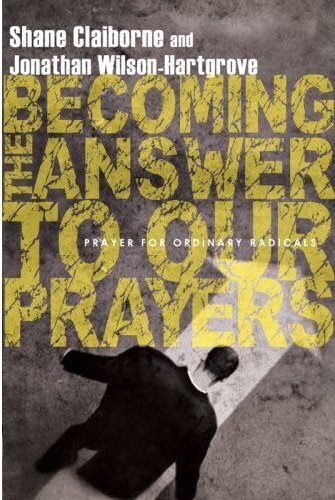Shane Claiborne and Jonathan Wilson-Hartgrove, Becoming the Answer to Our Prayers: Prayer for Ordinary Radicals. InterVarsity Press, 2008.
Referenced in:
- Shane Claiborne on Social Ministry, New Monasticism / Ordinary Radicals
- Missional Lifestyle, Discipleship, Spirituality – Spirituality and Social Ministry, Shane Claiborne
LifeandLeadership.com Summary
Claiborne and Wilson-Hartgrove are Christian activists associated with the New Monasticism Movement. This is not so much a book on how to pray, but a call to become active in fulfilling the kinds of things we pray for. It is less of a mystical spirituality than that found in Campolo and Darling’s The God of Intimacy and Action, but has a more activist bent.
This book succeeds where many books on spiritual formation fail, on at least two fronts. First, it helps the “active” to understand their need for prayer, but does so in a way that they are less prone to discredit it. Those who love the poor and marginalized are action-centered by nature. They heed the message of Amos 5:21-24 to shut up their songs and feasts and get out and help people. As John Perkins says, “when you see someone who needs a handicap ramp, don’t go pray for a ramp! Build them a ramp!” (11) Claiborne and Wilson-Hartgrove understand this drive among activists, and the impatience many of them have with “spirituality.” With these they resonate by saying, “Prayer is not so much about convincing God to do what we want God to do as it is about convincing ourselves to do what God wants to do.” (11) They remind us that prayer and action go together. Second, while it is true that we often have “inactive believers” who may do a lot of praying, we also have “worn-out activists” who do very little praying. (12) They need to nurture their relationships with God and others to avoid suffocating in the needs around them and becoming bitter, angry, and tired in their dealings with others.
Do not expect from this book a kind of cloistered, mystical experientialism. The authors convey a very holistic understanding of the place of prayer in shaping one’s will and action toward following the footsteps of Jesus into the most needy places. The book is centered around three prayers from the New Testament:
- The Lord’s Prayer (e.g. Matthew 6:9-13) which expresses one’s participation in God’s way of daily life that is “as practical as putting food on the table, paying the bills, getting along with neighbors, and wrestling with our egos. As we learn to reimagine the everyday light of Jesus’ prayer, we begin to live in a whole new world.” (12-13)
- Jesus’ Prayer for the Church (John 17) focusing on love and unity for the sake of the world and the unique witness of God’s people.
- Paul’s Prayer for Enlightenment (Ephesians 1:15-23) centered on growing deeper in spiritual wisdom and inheriting the full life God has designed for his creation even before it came into being. Here the authors draw upon the examples of the saints “who have grown in intimacy with Jesus while becoming the answer to their prayers.” (13)
Sprinkled throughout this book are the stories of people, past and present, who have experienced both prayer and the life of service and redemption to which prayer calls us.
Typical of spirituality among social activists, the authors are less contemplative and mystical. They share this characteristic with Christopher Heuretz’ Simple Spirituality (see review). Campolo and Darling’s The God of Intimacy and Action (see summary) provides an interesting balance. The foundational text for spiritual formation among social activists, however, is still Randy White’s Encounter God in the City
From the Publisher
“Prayer is not so much about convincing God to do what we want God to do as it is about convincing ourselves to do what God wants us to do.” Activists Shane Claiborne and Jonathan Wilson-Hartgrove show how prayer and action must go together. Their exposition of key Bible passages provides concrete examples of how a life of prayer fuels social engagement and the work of justice. Phrases like “give us this day our daily bread” and “forgive us our debts as we forgive our debtors” take on new meaning when applied to feeding the hungry or advocating for international debt relief. If you hope to see God change society, you must be an ordinary radical who prays—and then is ready to become the answer to your own prayers.
About the Authors
Shane Claiborne, author of The Irresistible Revolution (Zondervan), is a prominent activist and sought after speaker. He is one of the founding members of The Simple Way, a community in inner city Philadelphia that has helped birth and connect radical faith communities around the world. Shane serves on the board of directors for the Christian Community Development Association, and in his down-time is quite a dynamic circus performer.
Jonathan Wilson-Hartgrove (M.Div., Duke Divinity School) is director of the School for Conversion in Durham, North Carolina, where he is a member of the Rutba House new monastic community. He is the author of To Baghdad and Beyond and coauthor of Inhabiting the Church: Biblical Wisdom for a New Monasticism. He is also the coeditor of School(s) for Conversion: 12 Marks of a New Monasticism. Catch up with him at newmonasticism.org.
***For additional information on this resource, including reviews, click the bookstore links. Check the reference at page top or the links below for resource guides on related topics.***
See Other Resource Guides on Christian Social Ministry:
- Social Ministry, Introduction
- Theological and Philosophical Foundations of Social Ministry
- Spirituality for Ministry of Social Compassion and Justice
- Strategies For Christian Social Ministry
- Perspectives and Strategies For Social Ministry Among the Urban Poor, Urban Ministry
- Christian Perspectives on Political Theory and Church-State Relations
- Christian Perspectives on Economics and Public Policy
- Evangelism


